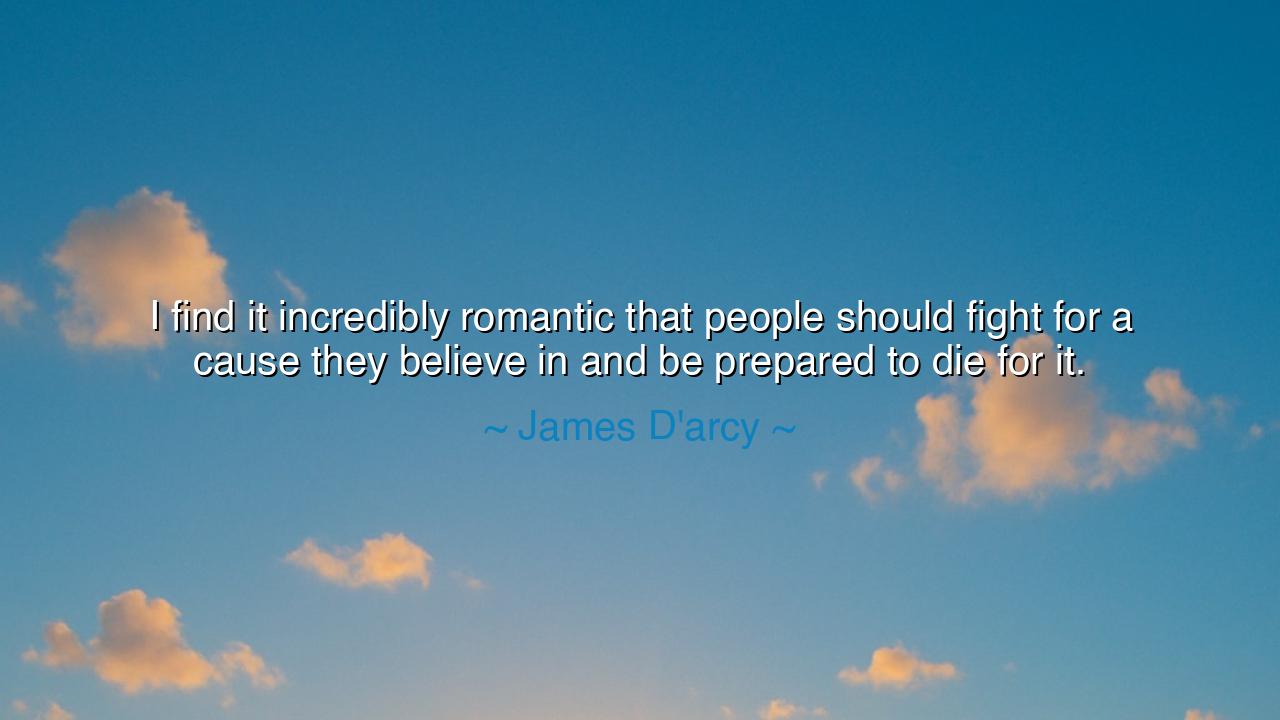
I find it incredibly romantic that people should fight for a
I find it incredibly romantic that people should fight for a cause they believe in and be prepared to die for it.






"I find it incredibly romantic that people should fight for a cause they believe in and be prepared to die for it." – James D'Arcy. These words strike at the heart of what it means to live with purpose and to fight not just for survival but for something greater—something that transcends the individual and calls upon the sacrifice of one’s own life for a cause that resonates with the soul. To D'Arcy, true romanticism is not found in fleeting love affairs or idealized fantasies, but in the noble struggle for ideals that shape the world and define the essence of humanity. It is the spirit of those who choose to lay down their lives for the pursuit of justice, freedom, or the greater good that embodies the highest form of love and devotion.
In the ancient world, such self-sacrifice was regarded with reverence and awe. The great Greek hero Achilles, known for his nearly invincible strength, was also a figure of great internal conflict. His decision to fight in the Trojan War, knowing it would likely lead to his death, represents the timeless heroic ideal: the willingness to embrace death for the glory of a cause. Achilles was not fighting merely for personal gain or for the thrill of battle but for the honor of his people and the eternal memory of his name. His romanticism was in the sacrifice of self for something greater than himself. The idea that one could choose glory over life is a theme that runs through the epic poetry of Homer, teaching us that true courage is not in avoiding death but in facing it for a cause worthy of our efforts.
This concept is not limited to ancient myth or literature, however; it resonates throughout history. Consider the story of Socrates, the philosopher who, when presented with the chance to escape his death sentence, chose instead to die for his beliefs. He believed that to live in violation of his conscience was a fate worse than death. His decision to drink the hemlock was a powerful affirmation that the sacrifice of self is sometimes necessary to uphold truth and integrity. Socrates’ death was not a tragic end but a symbol of the eternal power of philosophy and the importance of staying true to one’s convictions, even at the cost of life itself.
This theme of sacrifice for a cause carries forward through the centuries. Take, for example, the story of Joan of Arc, the young French heroine who, led by visions and a deep faith, fought to free her country from English rule during the Hundred Years’ War. Despite her age and lack of military experience, Joan led troops with an unwavering belief that her cause was divinely inspired. Her eventual martyrdom at the stake, when she was executed for her beliefs, is a poignant reminder that true romanticism is not in the trivial or the transient, but in the devotion to a higher calling that demands everything from an individual. Joan's life and death speak to the sacredness of fighting for what is right, even when the ultimate price is required.
In D'Arcy’s words, we find an understanding of romanticism that transcends the superficial. Romantic love, in this context, becomes a love for justice, freedom, and the values that elevate humanity. To fight for a cause, to dedicate one’s life to something that is not driven by personal gain but by the greater good, is perhaps the purest form of romantic devotion. It is not the act of seeking personal fulfillment, but of giving everything for a cause larger than oneself. This is not an ideal reserved for ancient heroes or historical figures; it is a call to all of us to seek the greater meaning in our own lives and to fight for the ideals we hold most dear.
The lesson we learn from D'Arcy’s reflection is that true romanticism is found in devotion, not to the fleeting and the material, but to the causes that define us as human beings. It teaches us that sacrifice, when made for the greater good, is not only noble but necessary. The romantic heart does not turn away from hardship, but embraces it with courage, knowing that in fighting for what is right, we honor something greater than ourselves. Whether it is in the pursuit of freedom, justice, or truth, the romantic spirit calls us to action, urging us to dedicate our lives to the causes that shape the future of our world.
Thus, let us embrace the romantic spirit that D'Arcy describes, not as a desire for personal gain, but as a commitment to higher ideals. Let us be willing to fight for the causes that matter most to us, to sacrifice for something greater than our individual selves. Whether in our own communities or on the larger stage of the world, let us act with conviction and purpose, knowing that it is in the fight for justice and truth that we find our true humanity. By doing so, we not only honor the timeless romantic ideal, but we contribute to a world where ideals are not just imagined, but realized.






AAdministratorAdministrator
Welcome, honored guests. Please leave a comment, we will respond soon